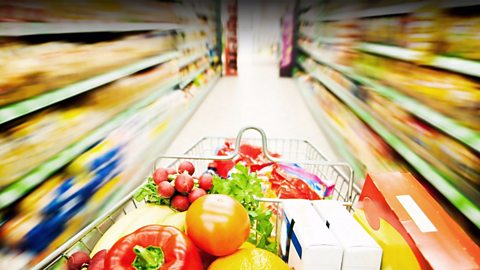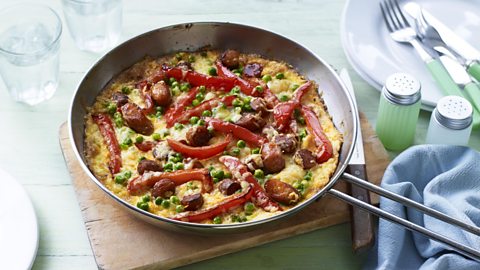How do supermarkets tempt you to spend more money?
When supermarkets first opened in the UK people were afraid to pick up items and put them in their trolley for fear of being told off. Now we have the opposite problem; we can’t stop ourselves from picking stuff up.
The average UK shopper makes 221 trips to the supermarket every year, giving us ample opportunity to buy food we don't need, but why do we do this?
To understand, you must step into the meticulously managed marketing zone that is a supermarket, where millions have been invested into figuring out how to get you to buy more.
It's all in the layout
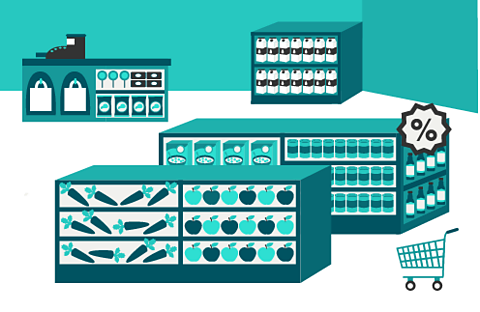
The layout of a supermarket can encourage extra purchases. Have you ever stood in a queue at the till when a chocolate bar started sweetly calling your name? Some supermarkets place sweet treats and magazines at the till to encourage impulse buys. This tactic works particularly well on children who use ‘pester power’.
A nationwide survey shows that 83% of parents have been pestered by their children to purchase junk food at supermarket tills and 75% have given in and bought junk food.
Looking for essentials like eggs and bread
Have you popped to the supermarket to buy a pint of milk and come home with five full carrier bags? Some supermarkets put essentials, such as milk and bread, far away from the entrance. This means you pass countless special offers and tempting displays.
The essentials are also placed far away from each other. Sometimes eggs are hidden in store. This egg hunt makes you travel through the supermarket. More time spent in the supermarket equals more time to spend money.
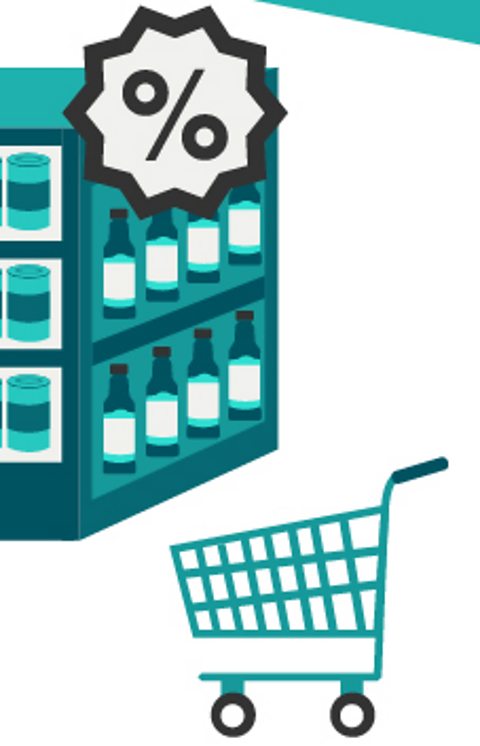
Bargains at aisle ends
Promotions and special offers generally take place at the end of aisles as these areas have high visibility. In fact we have become so conditioned to expect bargains at the end of aisles that people are 30% more likely to buy items at the end of the aisle than in the middle.
Fruit and vegetables
Fresh fruit and vegetables are often at the front of the supermarket. This doesn’t make sense for consumers as these items are likely to get bruised. However, buying healthy foods puts shoppers in a good mood and may make them feel better about buying less healthy foods later on.
Pesky pricing strategies
We all love a bargain; our brains even experience pleasure at the prospect of a bargain. Data from Kantar Wordpanel suggests that 40% of groceries in the UK are sold on promotion, but are consumers really getting a good deal?
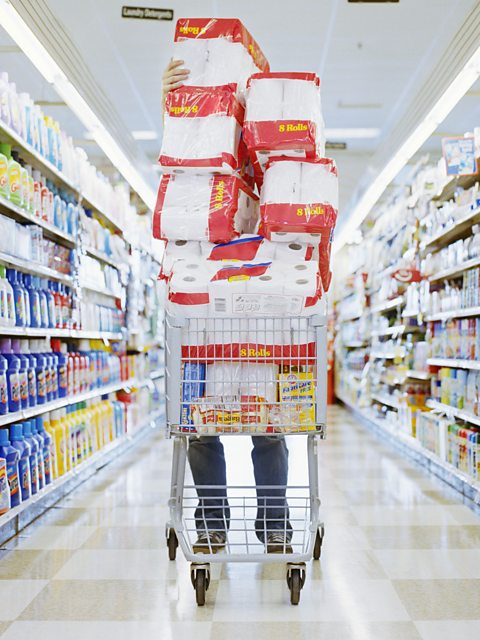
Encouraging multi-buys
Paying £4 for two cakes priced at £2 individually is not a bargain, it's just arithmetic. But if the individual price of the cake was increased to £3 before a multi-buy promotion, the £4 price would seem like a sweet deal.
Inconsistent unit pricing
Supermarkets sometimes show some products in kilograms and others in grams, making it difficult to compare prices.
Loss leaders
Most consumers only know the price of about 20 essential items, which are referred to as 'known value items'. These items are often sold at a loss. Often other items have high mark-ups.

Supermarket sensations
Do supermarkets manipulate our senses to get us to buy more?
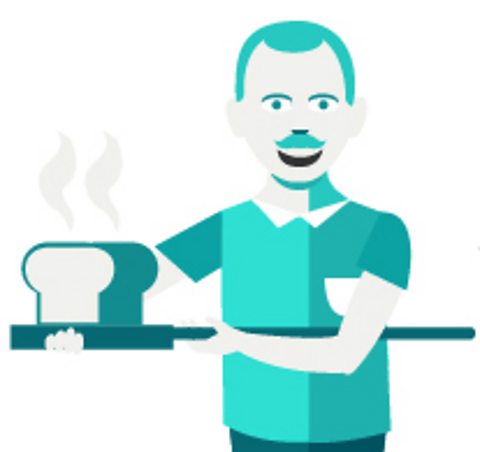
Smell
Smell is strongly linked to memory, making it a potent marketing tool. In supermarkets, smells evoke pleasurable memories, which encourage impulse buys. Smelling freshly baked bread in a supermarket may trigger a memory of a bakery in France – and next thing you know you've bought six croissants.

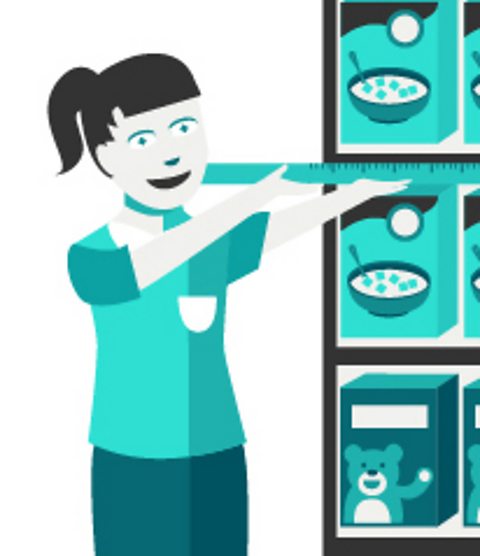
Sight
Supermarkets are a feast for the eyes, with colourful foods and promotions as far as the eye can see. Supermarkets place premium products at eye level. Children’s cereal may be placed on low shelves, at their eye level, leading to them using ‘pester power’ to get their parents to spend more. Studies have shown that if you make eye contact with a character on a cereal box you are more likely to feel connected to the brand and prefer it over other brands.

Sound
The music playing in a supermarket could affect your shopping habits. Slow music encourages a person to spend longer in supermarkets, which means they buy more.
Some supermarkets use smaller floor tiles in areas with expensive items to give the illusion of fast movement. As you notice the clicking of the trolley wheels becoming faster, you instinctively slow down.
Music may also affect what you buy. Studies have shown that when classical music is playing in a wine shop people buy more expensive wine. They also find that French music leads to French wine outselling German wine and vice versa.


Taste
Everybody loves free food; research has shown that 75% of people take free samples when offered. Companies also love free samples; this is because they can massively increase sales.
Why are free samples so effective? They may be operating at a subconscious level and triggering our deeply embedded instinct for reciprocity. In other words we feel the need to give something back to this smiling person who has just given us free food. Free samples can also pique our appetite, a free bite of chocolate reminds you how good it tastes and encourages you to buy it.
Preparing for your shop
Prepare yourself for your next trip to the supermarket with our tips and tricks to help make sure you only buy what you need.
If you are just going to the supermarket for a few essentials, you do not need a trolley. Studies show that the bigger the trolley you use, the more you buy. Try using a basket if you only need a few items, you are less likely to buy that 5kg bag of rice that's on offer if you have to carry it!
Give your trolley a health kick
A study from Cornell University showed that to make your trolley healthier you should divide it in two with a scarf or jacket and use one half for fruits, vegetables, dairy and meat. This trick causes people to spend more than twice as much of their budget on fruits and vegetables. The idea is that the partition suggests a social norm that individuals try to meet.
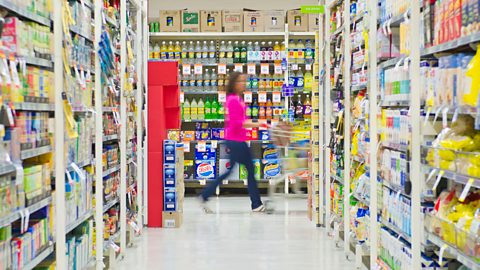
Five tips for spending less in the supermarket
- Make a list and stick to it
- Have a budget in mind
- Only shop with cash
- Do not shop when hungry
- Try online shopping
